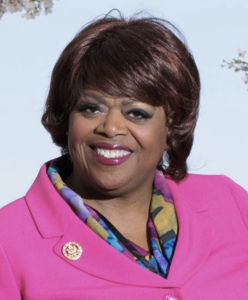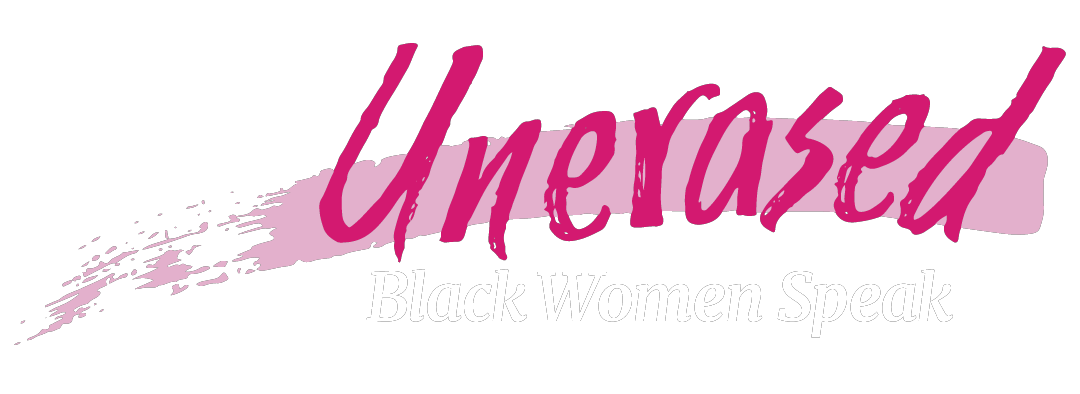
Rev. Dr. Ambassador Suzan Johnson Cook, pictured.
By Rev. Dr. Ambassador Suzan Johnson Cook, Faith Leader, Entrepreneur, Diplomat, Founder & CEO, Global Black Women’s Chamber Of Commerce
As a third-generation Black woman business owner, I stand on the shoulders, and side by side, shoulder to shoulder, with Black women who have been the front lines and back bones of our communities and our global nations for years. For example, the nation’s first female self-made millionaire was a Black woman, Madame C.J. Walker, who employed Black women and earned her fortune in the early 1900s with cosmetics and hair care products for Black women. In Los Angeles during the 1850s and 1860s, Bridget “Biddy” Mason — founder of the city’s first AME church — was one of the country’s first Black real estate entrepreneurs and philanthropists. And in the 1960’s my own mother, Dorothy “CJ” Johnson was the first Black woman millionaire I knew. The sole Black woman to own a watch guard security agency in the State of New York, she is credited with founding the longest running Black family-owned business in the Bronx, New York, now in its’ 57th year of successful operation.
When the slogan “BUILD BACK BETTER” became “live” during the 2020 Been Harris Presidential campaign, Black women entrepreneurs were already doing just that: building. Building, but not always receiving the “better” treatment when it comes to gender relations, access to capital, mentoring and garnering the huge government contracts. Many of us had been successful, but didn’t know how to scale, so when it came to the “huge” deals, they either went with men, Black and white, or white women, who jumped in to claim “minority” female owned status. Just as Black women have been at the forefront of equality and justice in every arena in America, so too are we rapidly continuing the legacy of entrepreneurship, building and strengthening the global economy. The late CBC Sister
Founder, Hon. Shirley Chisolm, once said “If they don’t give you a seat at the table, bring a folding chair”. Well, I’d like to add, as Beyonce once said, “Not only must we come to the table, but Black women entrepreneurs have had to “get the wood and Build the table.”
The Guidant report shows, “There are more female African-American small business owners than the general population of business owners. In the American small business universe, 27% of small businesses are women, among African-American owned businesses, 35% are women. And according to the NYC Small Business Office, New York City is “home to the largest concentration of women-owned businesses nationwide. These businesses are vital to our city’s economic growth – and in 2019 employed 321,000 people, generating $71 billion annually. “
Certainly, the pandemic has wreaked havoc on the entire economy. Not only has the light been shone on racial injustice, but also economic injustices.
According to Janice Hayes Keyser, “Black women are fueling the fight for economic justice”, and according to the annual American Press report, Kaya Dantlzer, a grassroot organizer states “When Black women-owned businesses are supported, communities fair better because women think more holistically about all members of the community.” And the fight for economic and gender rights is not limited to those in urban America.
“When the slogan ‘BUILD BACK BETTER’ became ‘live’ during the 2020 Biden Harris Presidential campaign, Black women entrepreneurs were already doing just that: building.”
The Southern Rural Black Women’s Initiative for Economic and Social Justice (SRBWI) promotes the first human rights agenda in the United States aimed at eradicating historical race, class, cultural, religious and gender barriers experienced by southern rural black women.
Black women-led Chambers of Commerces are bursting at the seams all over the US., and now globally, In Washington DC, we’ve created the Global Black Women’s Chamber of Commerce (GBWCC). According to founding Chair and CEO, Suzan Johnson Cook “We gave birth. We were pregnant during a pandemic and, during COVID, GBWCC was born.
We are the only Chamber that deals solely with Black women business owners worldwide, that means anywhere in the world where Black women are owning businesses. We have already created 25 new Black women business owners, distributors of PPE equipment, and are connecting with and collaborating with Black women business owners in Africa, Asia, the Caribbean, South America and Canada. Hosting a quarterly STATE OF BLACK WOMEN ™VIRTUAL SUMMIT series, we are bringing together business owners, thought leaders and others who are instrumental with running businesses in the public and private sectors.
Janice Heyser’s article stresses “While researchers say Black women are using their gifts and grit to uplift their communities, the struggle is real. According to the U.S. Census, on average, Black women were paid 63% of what non-Hispanic white men were paid in 2019. In addition, systemic racism means it is harder for Black women to get funding and access the tools, resources and mentors they need to be successful; experts say.
And Angela Gibson Shaw, President of the Greater Los Angeles African American Chamber of Commerce (GLAAACC) states, “The businesses Black women open and the corporate ladders they climb are not just for themselves, They are for the good of the community. They are central to the ongoing fight for power and parity.”
Black women start 763 new businesses every day. In fact, they’re the fastest growing group of entrepreneurs in America, yet they still lack access to the resources they need to grow their businesses. (American Express 2020 report)
- Being “ready to be my own boss” was the primary reason African-American survey respondents started their businesses (34%). This was followed by a “desire to pursue my own passion” (29%), “dissatisfaction with corporate America” (13%) and “the opportunity presented itself” (10%).
- What’s most exciting are the new partnerships and affiliations Black women entrepreneurs are having Black women start 763 new businesses every day. 91 with one another and with other groups. For example, the GBWCC distributorships came from a partnership between the EBW (Empowering a Billion Women), who had a distribution center, and gave the mentoring and training to the newly minted Black women entrepreneurs. Other groups like Greek House Davos, and ethnic, racial and religious groups, are also finding their way to partnerships and sponsorships.
- With the pledge by major corporations to close the wealth gap, both in America and Abroad, we hope we will see a surge in Business dealings and relationships with Black women entrepreneurs globally.
- It is important that the new White House administration not only invite Black women business owners for engagement and dialogue, but together with Congress initiate important policies and legislation that will broaden the reach, with specificity to Black women entrepreneurs.
“When the slogan ‘BUILD BACK BETTER’ became ‘live’ during the 2020 Biden Harris Presidential campaign, Black women entrepreneurs were already doing just that: building.”
The Southern Rural Black Women’s Initiative for Economic and Social Justice (SRBWI) promotes the first human rights agenda in the United States aimed at eradicating historical race, class, cultural, religious and gender barriers experienced by southern rural black women.
Black women-led Chambers of Commerces are bursting at the seams all over the US., and now globally, In Washington DC, we’ve created the Global Black Women’s Chamber of Commerce (GBWCC). According to founding Chair and CEO, Suzan Johnson Cook “We gave birth. We were pregnant during a pandemic and, during COVID, GBWCC was born.
We are the only Chamber that deals solely with Black women business owners worldwide, that means anywhere in the world where Black women are owning businesses. We have already created 25 new Black women business owners, distributors of PPE equipment, and are connecting with and collaborating with Black women business owners in Africa, Asia, the Caribbean, South America and Canada. Hosting a quarterly STATE OF BLACK WOMEN ™VIRTUAL SUMMIT series, we are bringing together business owners, thought leaders and others who are instrumental with running businesses in the public and private sectors.
Janice Heyser’s article stresses “While researchers say Black women are using their gifts and grit to uplift their communities, the struggle is real. According to the U.S. Census, on average, Black women were paid 63% of what non-Hispanic white men were paid in 2019. In addition, systemic racism means it is harder for Black women to get funding and access the tools, resources and mentors they need to be successful; experts say.
And Angela Gibson Shaw, President of the Greater Los Angeles African American Chamber of Commerce (GLAAACC) states, “The businesses Black women open and the corporate ladders they climb are not just for themselves, They are for the good of the community. They are central to the ongoing fight for power and parity.”
Black women start 763 new businesses every day. In fact, they’re the fastest growing group of entrepreneurs in America, yet they still lack access to the resources they need to grow their businesses. (American Express 2020 report)
- Being “ready to be my own boss” was the primary reason African-American survey respondents started their businesses (34%). This was followed by a “desire to pursue my own passion” (29%), “dissatisfaction with corporate America” (13%) and “the opportunity presented itself” (10%).
- What’s most exciting are the new partnerships and affiliations Black women entrepreneurs are having Black women start 763 new businesses every day. 91 with one another and with other groups. For example, the GBWCC distributorships came from a partnership between the EBW (Empowering a Billion Women), who had a distribution center, and gave the mentoring and training to the newly minted Black women entrepreneurs. Other groups like Greek House Davos, and ethnic, racial and religious groups, are also finding their way to partnerships and sponsorships.
- With the pledge by major corporations to close the wealth gap, both in America and Abroad, we hope we will see a surge in Business dealings and relationships with Black women entrepreneurs globally.
- It is important that the new White House administration not only invite Black women business owners for engagement and dialogue, but together with Congress initiate important policies and legislation that will broaden the reach, with specificity to Black women entrepreneurs.



